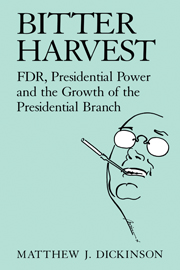Book contents
- Frontmatter
- Contents
- Preface and acknowledgments
- Introduction: The fruits of his labor? FDR and the growth of the presidential branch
- Part I Concepts and controversies
- Part II From cabinet to presidential government, 1933–9
- Part III Testing Roosevelt's staff system: The war years, 1939–45
- Part IV Lessons and considerations
- 8 “Competitive adhocracy”: The principles and implications of FDR's use of staff
- 9 Epilogue: Roosevelt's redux? – A research agenda
- References
- Indexes
8 - “Competitive adhocracy”: The principles and implications of FDR's use of staff
Published online by Cambridge University Press: 21 January 2010
- Frontmatter
- Contents
- Preface and acknowledgments
- Introduction: The fruits of his labor? FDR and the growth of the presidential branch
- Part I Concepts and controversies
- Part II From cabinet to presidential government, 1933–9
- Part III Testing Roosevelt's staff system: The war years, 1939–45
- Part IV Lessons and considerations
- 8 “Competitive adhocracy”: The principles and implications of FDR's use of staff
- 9 Epilogue: Roosevelt's redux? – A research agenda
- References
- Indexes
Summary
Roosevelt's advisory organization evolved according to his bargaining needs. Escalating demands for presidential leadership climaxed during World War II by thrusting FDR to the head of a wartime alliance and by placing responsibility for administering war production in his hands. His organizational response in both cases was largely governed by the blueprint articulated by the Brownlow Report and incorporated through the creation of the EOP and White House Office.
That blueprint, however, was predicated on a relatively fixed set of administrative tenets that, although never consciously articulated by FDR, nevertheless were consistently used by him to organize his staff support. I extract these from the preceding chapters for consideration here. Scholars have cited several of these tenets in previous studies. But typically they are explained in terms of Roosevelt's unique temperament and operating style. Personality-based explanations, however, do not tell why his administrative approach was successful.
In this chapter I try to explain the source of Roosevelt's administrative effectiveness. I begin with a review of the major tenets undergirding his staff system, which I call “competitive adhocracy.” I then place those tenets in the larger framework, presented in the introductory chapter, linking presidential staff to presidential power. Roosevelt's staff tenets, I argue, are best understood as interconnected parts in a systematic search for bargaining effectiveness. He institutionalized staff support to gain access to information and expertise relevant to recurring bargaining exchanges. 3 But he did so in a manner that proved particularly efficient at reducing his management costs, as measured in time and energy spent supervising his aides.
- Type
- Chapter
- Information
- Bitter HarvestFDR, Presidential Power and the Growth of the Presidential Branch, pp. 204 - 228Publisher: Cambridge University PressPrint publication year: 1996



